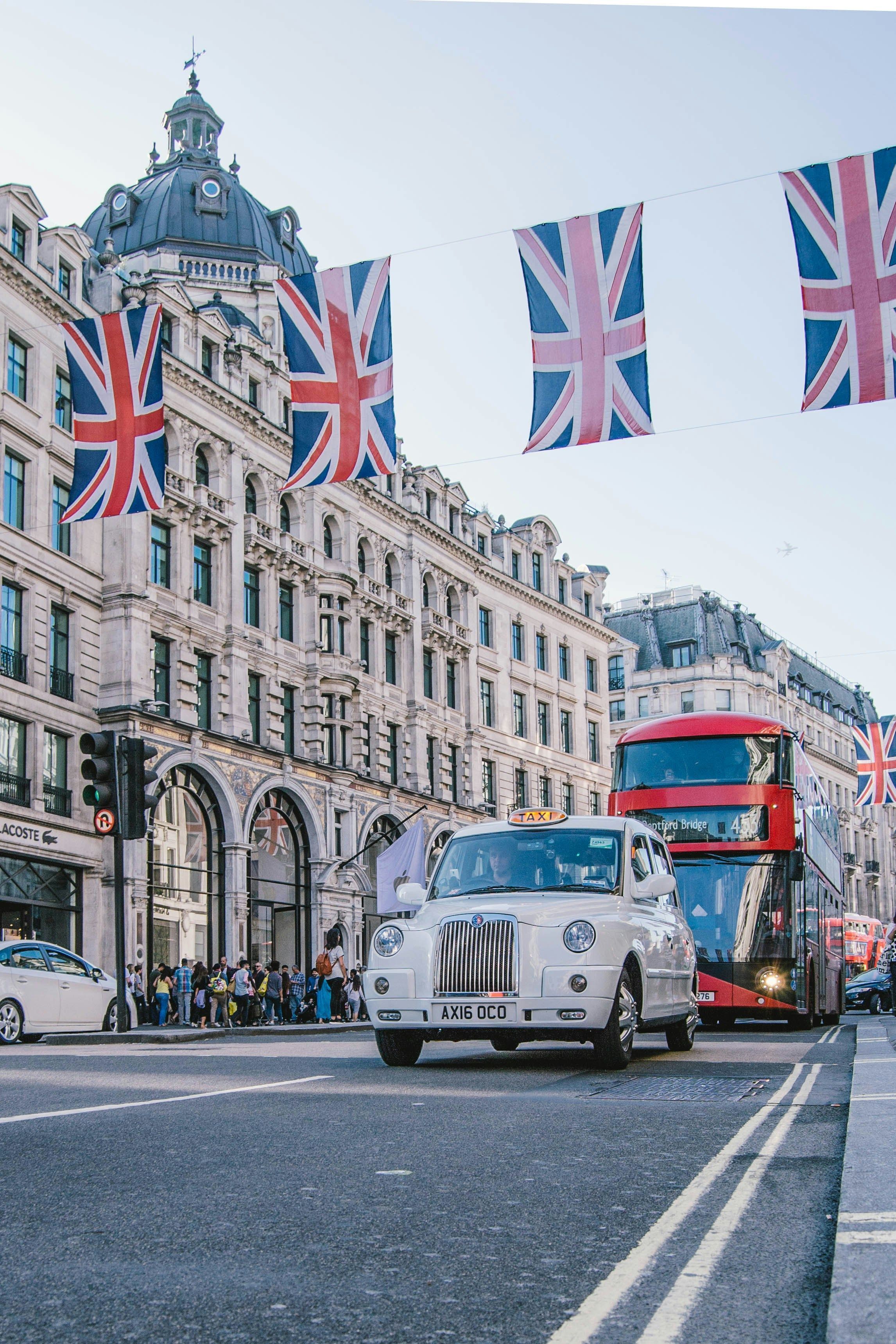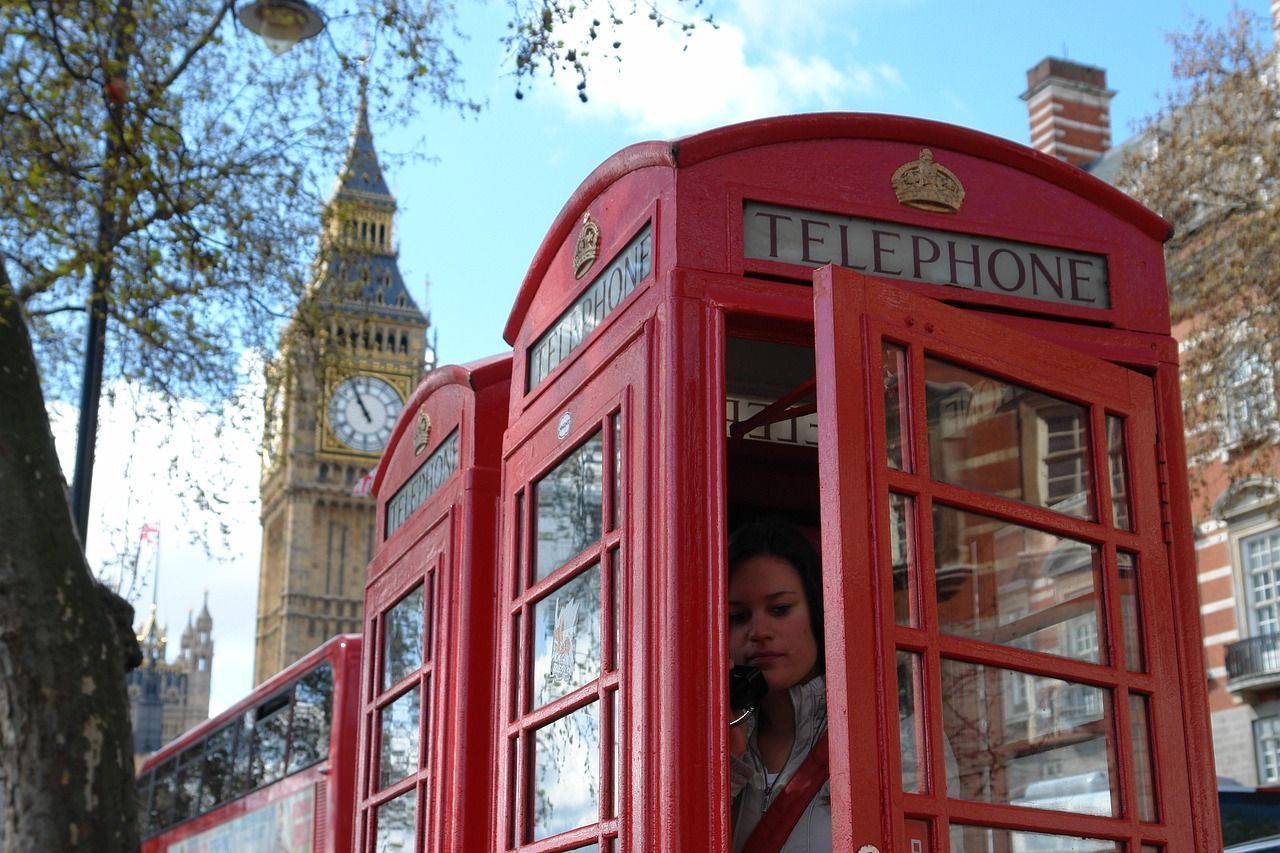Spring Promo

Moving from USA to UK: Your Ultimate Checklist
In this post...
Thinking about moving from the USA to the UK? Whether you’re pursuing a new job, enrolling in university, or turning long-distance love local, a big move like this can feel daunting. But don’t worry, we’ve got you covered in our US to UK relocation guide. From securing a UK visa for Americans to finding housing, this guide has everything you need to know for a smooth transition.
1. UK Visas for Americans
The first thing you’ll need before moving to the UK is a visa. Thankfully, the UK offers various visa options for Americans, depending on the reason you’re moving.
Work Visas
If you have a job lined up, you may be eligible to apply for a work visa. Here are some of the popular work visas for Americans:
● Skilled Worker visa: For those with a confirmed job offer with an approved UK employer. The job must be on the list of eligible occupations, which includes everything from civil engineers to teachers.
● Health and Care Worker visa: For doctors, nurses, health professionals, or adult social care professionals with a confirmed job offer with an approved UK employer.
● Senior or Specialist Worker visa: For transferring to your employer’s UK branch. Your employer has to sponsor you and your job must be on the list of eligible occupations.
Check out the full list of UK work visas on the UK government’s website. Keep in mind, Americans aren’t eligible for all the visas listed.
Study Visas
If you’re moving to the UK to study, a student visa is the way to go.
● Student visa: For Americans going to the UK to study at an approved school. You’ll need to be accepted into the program before you apply.
Family or Spousal Visa
● Family visa: For Americans joining their spouse, partner, fiancé, child, parent, or relative in the UK. Note: If your family member is in the UK on a work or student visa, this isn’t the right visa for you. You’ll need to apply as a dependent instead.
Learn how to apply for a UK visa for Americans
2. Healthcare in the UK
If you’re living in the UK as an American, one of the biggest (and perhaps best) differences is healthcare. Unlike the US, the UK offers free publicly funded healthcare, as well as private options. Here’s a rundown.
Free Public Healthcare
The UK's National Health Service (NHS) offers free healthcare to UK residents, including:
● GP visits
● Hospital treatment
● Some free prescriptions such as contraception
Pro tip: Once you arrive in the UK, register with a GP to access NHS healthcare. You don’t need a permanent address to register and you can usually do it online.
Private Healthcare
If you’re looking for specialized care or shorter wait times, private healthcare is another option:
● Offers faster access to specialists
● Has more comfortable hospitals, some with hotel-like qualities
● May cover services like dental work, eyecare, and homeopathy
Pro tip: Check to see if your employer offers private healthcare as part of its benefits.
3. Banking and Finances in the UK
Next in this US to UK relocation guide, we’ll go through everything you need to know about your finances in the UK.
Opening a UK Bank Account
To pay bills and manage day-to-day expenses, you’ll need a UK bank account. While your American bank account can keep you afloat for a bit, it’s best to get a UK bank account to avoid hefty exchange fees.
Traditional Banks
For traditionalists, big banks in the UK include Barclays, Lloyds, HSBC, and NatWest Group.
● Pros: Physical branches so you can get help in person
● Cons: Higher banking fees and lower interest rates
● What you need: Passport and proof of address in the UK
Digital Banks
For tech-savvy folks who prefer to bank online, digital banks like Monzo and Starling are popular.
● Pros: Higher interest rates and lower fees
● Cons: No physical branches and possible limits on ATM withdrawals
● What you need: Mobile phone, valid photo ID, and potentially a UK address
Exchanging Currency
For exchanging currency, consider money transfer services like Wise or Revolut. They’ll often have better exchange rates and lower fees than your bank.
Building Your Credit Score
Heads up: your US credit score won’t carry over to the UK. To build good credit in the UK:
● Keep the same bank account long term
● Pay bills on time (set up direct debits so you don’t forget!)
● Keep credit card balances low and pay them off in time
Remember: A good credit score is important if you plan to apply for a credit card, loan, or mortgage in the future.
4. Understanding Taxes
Taxes can be tricky when you’re living abroad, but understanding the basics will make things easier.
US Taxes
If you’re living in the UK as an American, you’ll still need to file your US income taxes:
● Worldwide income: You must report your worldwide income but convert the amounts to US dollars.
● Tax benefits: To avoid double taxation, the IRS offers tax benefits like foreign tax credit and foreign earned income exclusion if you file a US return.
● Tax help: For help with your US taxes while living abroad, hire a qualified accountant.
UK Taxes
You’ll start paying taxes in the UK once you become a tax resident:
● National Insurance number: If you’re moving to the UK to work, you’ll need a National Insurance number, the UK’s equivalent of the US Social Security number.
● UK tax residency: Once you’ve spent a certain amount of time in the UK or have ties to the UK (like a job or family), you’ll become a tax resident. Check your UK residence status here
● Worldwide income: You’ll need to pay taxes on all your income, including any income from the US (like investments and rental properties). But you can claim tax credits on your US tax returns.
5. Finding a Place to Live
Finding a place to live is best done in person. So before you arrive, book a short-term rental like an Airbnb to get you on your feet.

Renting in the UK
The rental market in the UK is competitive, but a little know-how can help you find your ideal home.
The Basics for Renting in the UK
● Leases: Most tenancy agreements are usually fixed for terms of 6 to 12 months
● Deposits: Landlords can’t charge more than 5 weeks’ rent for a deposit (unless your annual rent is over £50,000)
● Rent increases: If you’re on a fixed-term lease, the landlord can only raise the rent if you agree
● What you need to rent: An ID, visa, and proof of income are must-haves. Landlords may ask for other things like references.
Tips for Renting in the UK
● Explore neighbourhoods: Consider things like the vibe, safety, proximity to work or school, and the average cost of rentals.
● Set realistic expectations: Don’t expect oversized, American-style houses with all the modern amenities, you’ll likely have to compromise on some of your nice-to-haves.
● Search online: Check out sites like Zoopla and OpenRent for long-term rentals and SpareRoom for shared accommodations.
● Get help from letting agents: Letting agents can find rental properties for you, but they can’t charge you fees for their services.
● Make a good first impression: A single rental property might have a long lineup of applicants, so stand out by dressing up for viewings and bringing important documents like your passport, employment contracts, and bank statements.
● Be aware of scams: Never pay anything to anyone before viewing a property in person and signing an agreement.
6. Phone and Internet in the UK
Before you settle in, make sure your phone and internet are ready to go.
Mobile Plans in the UK
The UK has four major mobile providers: EE, O2, Three, and Vodafone. Smaller companies like VOXI and Smarty use the same networks as the major providers, and often have cheaper plans.
What you need for a UK mobile plan:
● A UK bank account
● Proof of a UK address
Stay Connected With an eSIM in the UK
Before committing to a phone plan, stay connected in the UK with an eSIM from Sim Local. You’ll get instant access to calls, texts, and data without needing a UK bank account or address. Below are our top recommended UK eSIM plans:
7. Schooling in the UK
If you’re moving with kids, the UK offers a range of schooling options. Most kids attend state schools, but other options include private schools, academies, faith schools, and state boarding schools.
State Schools in the UK
- Free for kids aged 5 to 16
- Goes from year 1 (age 5) to year 11 (age 16)
- At the end of year 11, students take GCSE exams
After age 16, students can choose to:
- Stay in school for Sixth Form (years 12 to 13) and take A-levels to prepare for university
- Start an apprenticeship in a trade
- Enroll in a vocational college
Learn more about the types of school in the UK
8. Driving in the UK
From daily commutes to weekend road trips, driving can give you more freedom in the UK. But if you’re used to American roads, keep in mind that driving is a bit different in the UK.
Main Differences Between Driving in the UK and the USA
● People drive on the left side of the road in the UK
● The driver’s seat is on the right side of the car in the UK
● Manual cars (stick shifts) are more common in the UK
● Roundabouts are everywhere in the UK, so get used to entering and exiting them
Getting a UK Driving Licence
● You can drive on your US licence for up to 12 months
● You can’t exchange a US licence for a UK one
● To get a UK licence, you’ll need to pass a theory test and practical test
● Before your 12 months is up, apply for a provisional driving licence – you’ll need it for the driving tests
Buying and Owning a Car in the UK
● There are no restrictions for foreigners buying a car in the UK
● Once you buy a car, you’ll need to register and insure it
● New cars need their first Ministry of Transport (MOT) test after 3 years
9. Shipping Your Stuff
Knowing what to bring (and what to leave behind) is an important part of your checklist for moving to the UK from America.
What to Bring to the UK
● Clothes: Pack for all seasons (especially rain).
● Portable electronics: Bring your phone, laptop, and chargers – and don’t forget UK adapters.
● Important documents: Bring tax papers, medical records, prescriptions, and school records.
● Sentimental items: For long-term moves, bring things like photos, keepsakes, and anything else you can’t replace.
What to Sell or Leave in the US
● Electrical appliances: Most US appliances run on a different voltage than those in the UK. Things like hair dryers and small appliances won’t work unless you use a bulky voltage converter.
● Large furniture: Homes tend to be smaller in the UK than the US, so your furniture might not fit in your new space. Plus, some rentals come furnished.
● Car: In the UK, they drive on the left side of the road – and the steering wheel is on the right side of the car. So bringing an American car can be awkward and even unsafe.
How to Bring Your Stuff to the UK
● International movers: An international moving company is ideal if you have a lot of stuff. They can pack your things, handle customs, and ship everything door to door.
● Baggage shipping services: Services like Send My Bag are fast and reliable if you’re shipping a few boxes or things like bikes and sports equipment. Delivery typically takes 2 to 5 days.
● Extra airline baggage: If you’ve downsized your life into a few suitcases, then paying for some extra bags might be your best bet. Just check your airline’s baggage fees first.
10. Cultural Differences
Though exciting, moving from the USA to the UK can take some initial adjustment. Here are some things to expect.
British Speak
The Brits don’t just speak in a different accent - they’ve got their own way of saying things. Here are a few common sayings and words:
● You alright?: Don’t be alarmed if someone asks if you’re alright. It’s just the British way of asking, “How are you?”
● Pants: Don’t get your knickers in a knot over this one, but “pants” means underwear in the UK. “Trousers” is the term you’ll need.
● Toilet: Looking for the bathroom? It’s commonly called the “toilet” in the UK.
● Queue: The commonly used word for a “lineup”.
● Chips: There’s a reason why it’s called “fish and chips” – because chips are fries (just chunkier).
● Crisps: If “chips” are fries, then “crisps” are chips. Make sense?
Other Things to Note
● Brits tend to be more reserved and polite, but their humour is sarcastic, dry, and self-deprecating.
● Pubs are social hubs, so don’t be afraid to join the locals for a pint.
● Tipping isn’t as big in the UK as it is in the US, but it’s good to leave a 10 to 15% tip at restaurants if there’s no service charge added
Helpful Resources
Besides this US to UK relocation guide, here are some other resources to help you with your move:
● GOV.UK: Apply for a UK Visa for Americans in the USA
● GOV.UK: Apply for a National Insurance Number
● NHS: How to register with a GP surgery
● GOV.UK: Tax on foreign income
● IRS: US citizens and resident aliens abroad
● Facebook: Americans moving to, and living in the UK - A helpful expat group
● Facebook: Americans in London
Moving from the US to the UK is a big step, but don’t sweat. Plan ahead, stay flexible, and bookmark this checklist for moving to the UK from America. And before you fly to the UK, don’t forget to get an eSIM from Sim Local, so you can stay connected from the moment you land.
Related Articles
 A Beginner’s Guide to Moving to the UK
A Beginner’s Guide to Moving to the UKNo matter where you’re moving from, there are a few things you should know before booking your flight.
Read More Top 10 eSIMs for the UK
Top 10 eSIMs for the UK Just visiting? Stay connected with local and international providers. Choose from Three UK, Lycamobile, and more!
Read More What Is an eSIM UK? Your Guide to Cheaper, Smarter Travel Data
What Is an eSIM UK? Your Guide to Cheaper, Smarter Travel DataDiscover what a UK eSIM is, how it works and why it’s a smarter way to stay connected. This guide breaks down everything travellers need to know with no jargon, just real info and instant solutions from Sim Local.
Read MoreExplore Our Local UK eSIM Plans
Explore Our Local UK eSIM Plans